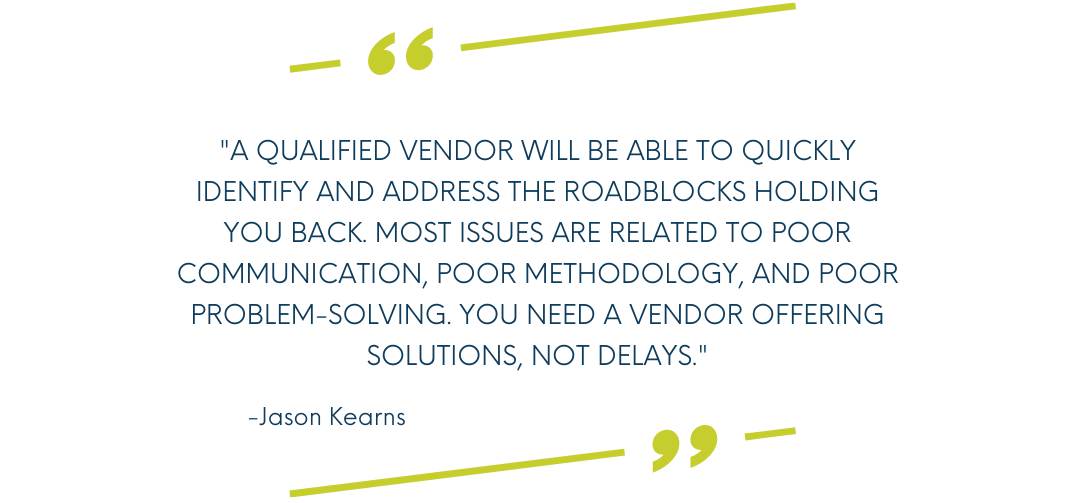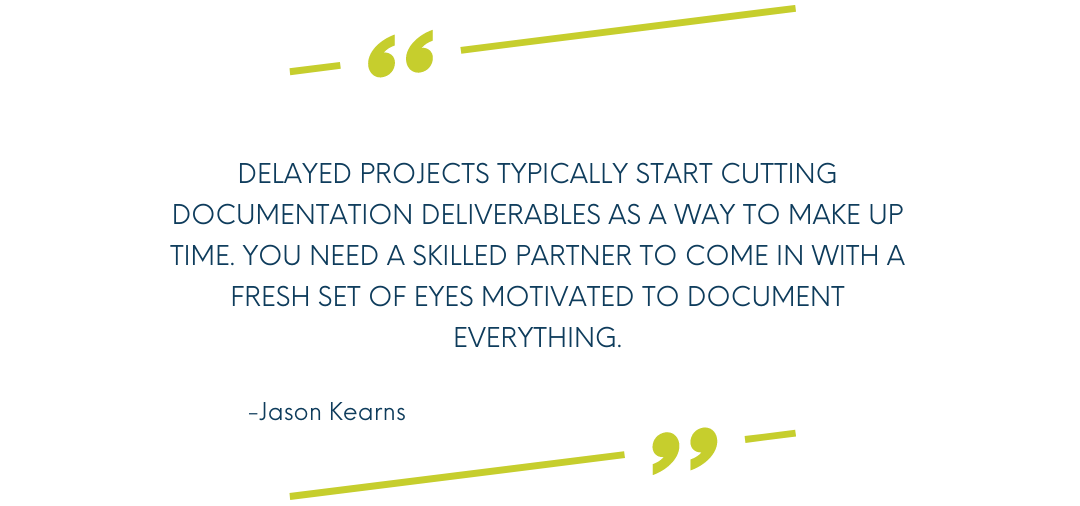Author: Lizzy Wolff
Are you in a dysfunctional partnership with your software implementation (SI) partner? Has your implementation been dragged out far past the original delivery deadline? Have you been contemplating a vendor switch as a result? Do you wish you could go back in time and choose a vendor based on what you’ve learned on this project?
It can seem intimidating or cumbersome to switch SI vendors before launch. Companies often stick with unsatisfactory or underperforming SI partners to:
- Avoid losing money on fixed-fee contracts
- Avoid interruption to business
- Avoid rework
- Avoid chaotic leadership optics
For these reasons, organizations rarely make the necessary upgrade before the official go-live milestone is reached. But you’re reading this article because you’re aware that your project, on it’s current trajectory, might fail and you might lose buy-in.
After handling countless scenarios like this, we have discovered that upgrading SI vendors now, regardless of the phase of the project, leads to a better chance for long term success.
We consulted our SVP of Technical Services, Jason Kearns, to create this article. With more than 20 years of software implementation experience, he has seen many of these scenarios play out.

In this article, we will discuss how changing SI partners before the launch of your software will yield a better result.
10 Things your organization stands to gain
Switching SI (Systems Integrator) partners before launching new software can be advantageous compared to doing it after the launch due to the following reasons:
- Overall Cost and Time Savings: Switching SI partners before the software launch allows for a more streamlined and realistic implementation process. Addressing any issues or misalignments early on can prevent costly delays and rework that might occur if the switch happens after the launch.
- Preventing Technical Debt: Technical debt refers to the additional work and costs accumulating when suboptimal solutions are implemented and must be fixed or reworked later. Upgrading SI partners before the launch ensures the software is developed with the right architecture and design, reducing the chances of incurring technical debt.
- Mitigating Risks: Launching new software is a critical phase, and any significant issues that arise during or after the launch can have severe consequences for the organization. Upgrading SI partners before the launch can proactively identify and address potential risks and challenges, minimizing the impact on the launch timeline and user experience.
- Consistent Project Vision: Upgrading SI partners before the launch ensures the entire project team is aligned with the same vision and objectives. This enhances collaboration and coordination among all stakeholders, leading to a more cohesive and successful software launch.
- Avoiding Disruptions: Post-launch SI partner upgrades can cause disruptions to the software's functionality and user experience, leading to dissatisfaction among end-users. Switching before the launch allows for a smoother transition, minimizing disruptions and ensuring a more positive user experience.
- Better Knowledge Transfer: Implementing new software involves substantial knowledge transfer from the SI partner to the organization's team. By switching SI partners before the launch, the new partner can be involved from the early stages, allowing for a more effective knowledge transfer and a better understanding of the software's intricacies.
- Improved Planning and Testing: Switching SI partners before the launch allows for more comprehensive planning and testing. The new SI partner can thoroughly review the project's requirements and test the software thoroughly to ensure it meets the organization's needs and expectations.
- Optimal Utilization of Resources: The organization can allocate its resources more efficiently by upgrading before the launch. It prevents unnecessary resource utilization on a project that might need to be redone or reevaluated after switching SI partners.
- Greater Stakeholder Confidence: A well-planned SI partner upgrade before the launch demonstrates proactive decision-making and commitment to project success. This can boost stakeholders' confidence in the project and its management.
- Higher Likelihood of Success: Overall, upgrading SI partners before the launch increases the likelihood of a successful software launch. It allows the organization to address any potential challenges or issues early on and set the remaining phases of the project on the right path from the beginning.
What your organization could risk if you don’t
A poorly launched solution can cause serious damage - some irrevocable. By upgrading partners before launch, you can avoid the following risks:
- Quality of the Software: An underperforming SI partner may deliver a buggy, unreliable software product not meeting the intended functionality or user experience. Poor software quality can lead to customer dissatisfaction, decreased user adoption, and damage to the organization's reputation.
- Project Delays: As you might have already noticed, underperformance can cause delays in the project timeline. These delays could have serious financial consequences if the software launch is tied to a specific market window or business strategy.
- Wasted Resources: Organizations invest time, money, and effort in partnering with SIs. If the SI is underperforming, the resources spent on the partnership are essentially wasted. By engaging a more capable partner sooner, potentially wasted resources can be utilized.
- Lost Business Opportunities: Underperformance can lead to missed opportunities if the software launch is tied to a business opportunity or a competitive advantage. Competitors who launch similar products successfully may gain an edge, leaving the organization disadvantaged in the market.
- Customer Satisfaction: A poorly performing software product can lead to frustrated customers who experience issues, glitches, and downtime. This can damage customer relationships, reduce customer trust, and result in churn. Negative word-of-mouth from dissatisfied customers can further harm the organization's reputation.
- Legal and Compliance Risks: Underperformance can lead to non-compliance issues if the software launch involves regulatory compliance or legal requirements. This might result in legal penalties, fines, or other actions that could be financially damaging and tarnish the organization's image.
- Employee Morale: An underperforming SI partnership can demoralize internal project teams investing time and effort into the project. Frustrations and burnout can arise if team members feel their hard work is not translating into progress.
- Long-Term Costs: The costs of dealing with the aftermath of an unsuccessful software launch can extend beyond the initial project. Ongoing maintenance, updates, and fixes to address the software's shortcomings can accumulate substantial costs over time.
Sooner is better than later
While switching SI partners before the launch may require some upfront effort and coordination, it offers significant benefits in cost savings, risk mitigation, and a more successful implementation process.
One of the most common misconceptions about pre-launch SI vendor changes is that it signifies lack of expertise or sound decision-making. But our clients have reported otherwise: Making decisions to ensure the long term success of the program exemplifies leadership, commitment, and grit.
Jason tells us that the fresh perspective of an expert vendor will improve the result.

If you read this and found the information Canidium provided helpful, reach out to us, we’ve helped many in your situation before. And if you’re not ready to make that step, these resources are your next stop.
The X-Ray for SPM: How Technical Health Checks Optimize SAP Commissions
The sherpa of business growth: The value of a strategic partner
If you’re ready to discuss a technical health check on your project, contact us today.
Photo by Jason Blackeye on Unsplash
